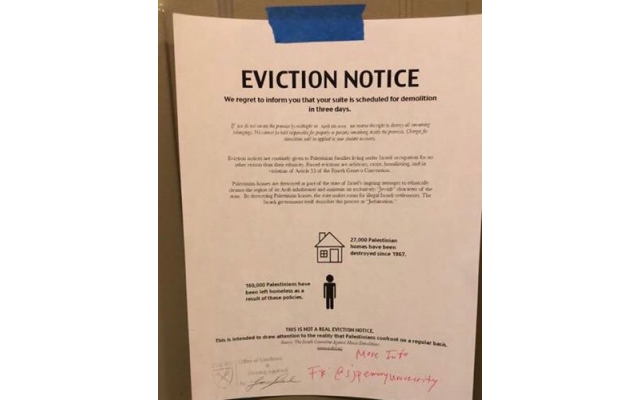Is Emory’s Statement on Flyers Enough?
Emory University’s acknowledgment of the “personal pain” that mock-eviction notices caused Jewish students “is a step in the right direction,” but “falls short of what is needed.”
Dave Schechter is a veteran journalist whose career includes writing and producing reports from Israel and elsewhere in the Middle East.
Emory University’s acknowledgment of the “personal pain” that mock-eviction notices caused Jewish students “is a step in the right direction,” but “falls short of what is needed,” in the view of the Anti-Defamation League.
At issue is a flyer posted April 2 on dormitory doors and at an off-campus residence by pro-Palestinian students and the university’s response to the incident.
Emory President Claire E. Sterk said April 12, “I have had the privilege of listening to the concerns of a wide range of voices both within and beyond our Emory community. I have been deeply moved not only by what I’ve heard, but also by the personal pain shared by students — and by members of the wider Jewish community — who feel threatened, afraid, and angry.
“All of us are aware that anti-Semitic incidents are on the rise on college campuses and throughout American society today,” Sterk said. “It is in that context of escalating intolerance that our Jewish students found the mock-eviction notices — which incorrectly gave the impression that Emory endorsed the message on the flyers — on their doors. Although Jewish students were not singled out, they and their families justifiably felt targeted, given the world in which we live.”
Emory administrators and staff have received complaints and expressions of concern from the heads of national Jewish organizations, the Atlanta offices of those organizations, local Jewish agencies and clergy, and Jewish faculty, alumni, students, and parents (some of the latter reportedly using impolite language).

In an April 14 statement to the Atlanta Jewish Times, ADL Regional Director Allison Padilla-Goodman said: “Although the University’s most recent statement about the mock eviction notices is a step in the right direction and we appreciate their recognition of the particular pain and impact of these incidents to Jewish students and the Jewish community, it falls short of what is needed. In advance of an April 10th meeting with President Sterk, ADL sent a letter outlining our concerns and expectations, and we are disappointed that after meeting with and hearing from the Jewish community repeatedly over a 10-day period, the university has still not made a definitive statement about anti-Semitism, assured there would be consequences for housing policy violations, or that student safety would be a top priority,” Padilla-Goodman said.
“The issue at hand is conduct, not expression, which invaded the privacy of student residences in violation of Emory policy. Indeed, university policy ensures all students a myriad of avenues to express themselves. We look forward to hearing the outcomes of their investigation and plans for action steps, and to working with the university’s administration and students to make sure that anti-Semitism has no place at Emory moving forward.”
Sterk met April 10 with representatives of Jewish communal organizations and rabbis. The AJT was told that students were not part of that meeting, but that Sterk has talked with Jewish students.
The flyers were posted by Students for Justice in Palestine as part of Israel Apartheid Week, which coincided with Emory Israel Week sponsored by Eagles for Israel.
According to a webpage the university created about the incident, “Emory’s Office of Campus Life did not approve the flyer content.” However, “The practice of Campus Life ‘stamping’ flyers to indicate that they were from a recognized student organization or academic or administrative department is confusing and has been discontinued. It can convey, inaccurately, that Emory endorses particular political speech.”

The official-looking notices advised: “We regret to inform you that your suite is scheduled for demolition in three days.” The flyer said that “Palestinian homes are destroyed as part of the state of Israel’s ongoing attempts to ethnically cleanse the region of its Arab inhabitants and maintain an exclusively ‘Jewish’ character of the state.”
A disclaimer at the bottom advised that the eviction notice was not real.
Emory’s Campus Life office later ordered the flyers removed because their distribution violated a policy against posting on doors without student consent. The management at the Emory Point apartments also had the flyers removed.
An estimated 17 percent of Emory’s undergraduate students and 10 percent of its graduate students are Jewish, according to the Hillel International website.
A Jewish alum who asked what action the Emory Alumni Association was taking, saying that she and another alum “want to make sure that it is known we do not find this acceptable,” received the following response on April 15: “We appreciate that you and other alumni seek to be thoroughly informed about this incident and support our Jewish students. I can confirm that there is a comprehensive review underway of the events that have taken place here on our campus, together with planning for clear next steps. … We’re asking our alumni for patience as our university leaders continue to work through this issue and move through the investigation. At this point we have not found that the Jewish community was specifically targeted, but we acknowledge the hurt and fear this incident has caused. We are committed to the safety and security of all of our students.”
Within days of the flyers appearing, a coalition of Atlanta Jewish organizations, including the ADL’s regional office, called on the university to impose “severe consequences” on the perpetrators; the director of Hillels of Georgia called April 5 for the SJP chapter to be put on probation for a year and its university adviser removed; and SJP called April 5 for a boycott of several campus Jewish organizations.
Hillels of Georgia did not reply to questions posed by the AJT about Sterk’s April 12 statement and what response it had received to its call for punishment of SJP.
On April 15, SJP said on its Facebook page, “We do not regret disseminating the mock eviction notices, as it shed light on a reality that is often obfuscated, dismissed, or ignored, and the notices initiated a conversation that has been overwhelmingly generative.”




comments